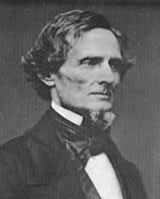|
From FirstStrikeNuts.com First-Strike Fiascos
Lincoln had campaigned on a policy to prohibit the expansion of slavery into the territories and new states. The southern states recognized that this policy, if implemented, would result in diminished political power in Congress by slave-holding states. In his inaugural address, President Lincoln said, “In your hands, my dissatisfied fellow-countrymen, and not in mine, is the momentous issue of civil war. The government will not assail you. You can have no conflict, without being yourselves the aggressors.” Lincoln was determined that the Union not fire the first shot of the war. Upon taking office, Lincoln was informed that merchants were forbidden to sell food and provisions to the Union forces at Ft. Sumter in Charleston harbor. They were to be starved into surrender. Lincoln found a way to convert this predicament to his advantage. He dispatched a courier to deliver a message to the South Carolina governor, “I am directed by the President of the United States to notify you to expect an attempt will be made to supply Fort Sumter with provisions only; and that, if such attempt be not resisted, no effort to throw in men, arms, or ammunition will be made, without further notice, or in case of an attack upon the Fort.” Now the predicament was in the hands of the rebels. Jefferson Davis, president of the Confederacy, decided to attack, if the fort did not surrender. When the Union forces refused the ultimatum, the fort was shelled. The Civil War was begun. Lincoln called up 75,000 troops, for 90-day enlistments, to put down the rebellion. Four additional States seceded. Southerners expected the North would grow weary of the war and agree to their secession. History tells another story. Four bitter years of fighting resulted in the deaths of more than 600,000 soldiers, countless others wounded. The South was devastated, not to regain its economic strength for decades to follow. Such misjudgments as Jeff Davis’s illustrate the heavy burden inherent in a “first-strike policy.” By contrast, Mr. Lincoln’s refusal to strike the first blow united the Union and contributed toward ultimate victory.
Published previously in earlier website, July 4, 2003. XXX
© Copyright by FirstStrikeNuts.com |
